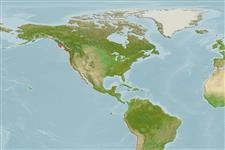Environment: milieu / climate zone / depth range / distribution range
Écologie
marin démersal; profondeur 0 - 50 m (Ref. 56557). Temperate; 55°N - 36°N, 129°E - 122°W
Eastern Pacific: southern British Columbia to central California, USA. Authors giving range up to northwestern Pacific classify Pholis nea Peden & Hughes, 1984 as a synonym of Pholis ornata.
Taille / Poids / Âge
Maturity: Lm ? range ? - ? cm
Max length : 30.0 cm TL mâle / non sexé; (Ref. 2850)
Description synthétique
Clés d'identification | Morphologie | Morphométrie
Épines dorsales (Total) : 74 - 79; Rayons mous dorsaux (Total) : 0; Épines anales: 2; Rayons mous anaux: 35 - 38. Caudal rounded. Pelvic fins minute.
Facultative air-breathing in the genus (Ref. 126274); Found in inshore areas, on mud bottoms among eelgrass and seaweed (Ref. 2850). Feeds on small mollusks and crustaceans (Ref. 2850). Both male and female guard egg mass (Ref. 2850).
Life cycle and mating behavior
Maturité | Reproduction | Frai | Œufs | Fécondité | Larves
Oviparous (Ref. 101786). Adhesive eggs attached to a nest substrate are brooded by both parents (Ref. 101786).
Eschmeyer, W.N., E.S. Herald and H. Hammann, 1983. A field guide to Pacific coast fishes of North America. Boston (MA, USA): Houghton Mifflin Company. xii+336 p. (Ref. 2850)
Statut dans la liste rouge de l'IUCN (Ref. 130435: Version 2024-1)
Menace pour l'homme
Harmless
Utilisations par l'homme
Outils
Articles particuliers
Télécharger en XML
Sources Internet
Estimates based on models
Preferred temperature (Ref.
123201): 8.9 - 12.5, mean 10.4 °C (based on 42 cells).
Phylogenetic diversity index (Ref.
82804): PD
50 = 0.5005 [Uniqueness, from 0.5 = low to 2.0 = high].
Bayesian length-weight: a=0.00162 (0.00069 - 0.00382), b=3.19 (2.99 - 3.39), in cm total length, based on LWR estimates for this (Sub)family-body shape (Ref.
93245).
Niveau trophique (Ref.
69278): 3.6 ±0.50 se; based on food items.
Résilience (Ref.
120179): Milieu, temps minimum de doublement de population : 1,4 à 4,4 années (Preliminary K or Fecundity.).
Fishing Vulnerability (Ref.
59153): Low vulnerability (20 of 100).
